#linguistics fun
Text
Uh oh, it's sleepy grumpy Pika. Y'all know what that means, right?
It means I have no filter for my opinions.
If you're dissatisfied with the way Katsuki's bullying of Izuku is handled in MHA because you expected him to be confronted by someone else about it in some way, it's probably because you are unaware of the difference between bullying and attitudes towards it in Japan versus in your country of origin. I believe everyone would benefit from researching bullying in Japan. They do NOT view it the same way the west does, y'all.
And I guarantee when you learn about it, you're gonna find some stuff that makes you uncomfortable and horrified, because it's gonna take a while for you to get enough information to give context to a lot of the history and attitudes you'll find. AND EVEN THEN, EVEN WHEN YOU HAVE THAT CONTEXT, you're still definitely not going to like it.
However, with any luck, you'll see how MHA's portrayal of Katsuki's bullying is shockingly sympathetic and heartwarming to many people. It's because, from the perspective of a Japanese audience, Izuku was not targeted and bullied by Katsuki in the way we're used to seeing such situations portrayed in the west. Izuku was bullied by everyone. His classmates, his teachers, the pro heroes he encountered, and society in general ALL participated in the bullying of Izuku, because societal pressures to conform in Japan are MASSIVE, and that can often manifest as one form of bullying or another.
Katsuki's bullying is just the one that the story chooses to flesh out. It's the one that Horikoshi develops. Katsuki is the bully that changes his own perspective first and drastically, the one who realizes the greatness in Izuku and accepts that and comes to his side long before the rest of society can catch up. It is largely understood by the Japanese audience that Katsuki in middle school didn't seek Izuku out and follow him home every day to beat him up; Katsuki mostly ignored Izuku until Izuku would do something to remind Katsuki of his insecurities, and so he would lash out. And no one else at let's say Izuku's middle school would understand the true reason why Katsuki would lash out because what he does resembles what all of Izuku's bullies do to him: pressure him to conform. Pre-One For All Izuku stands out as different and constantly tries to rise above his position to become something society decrees he cannot be. Therefore, a significant part of Japanese society will generally approve of attempts to make him conform, even when some of those attempts are harsh and cruel and unreasonable and reactionary. MHA presents a caricature of that in the form of Izuku's middle school.
The fact that Katsuki identifies this toxic behavior in himself later in the story and decides to actively do something to change it IS the radical part. It's the piece that fits into the themes of MHA. It highlights a generally-accepted behavior in society that maybe society should rethink. It's asking for society to reconsider how it pressures people to conform, that sometimes nonconformity is good or at least should be tolerated to some degree. That's why Katsuki's story focuses so much on how his old behavior stems from fear. From the perspective of a "properly-functioning" collectivist society, pressure to conform should be done for the good of everyone in the society, not out of fear and misunderstanding. Katsuki's character arc provides one potential map for others in society to see the light and get to where he does.
And that's to say nothing of how Japan's versions of confrontation or retribution often look different from how they do in the west, that many of the forms of confrontation some people in the western fandom cry out for with regards to Katsuki sound absurd to an audience in the know. The karmic punishments Katsuki endures throughout the story are often overlooked by western readers, and is it any surprise? That readers from some societies--societies that laud nonconformity, tolerate counterculture, openly criticize the systems that be, preach about individual freedom and responsibility and justice and fairness, and watch and make movies and TV shows and other media about how victims of bullies achieve their righteous revenge--often miss how MHA doles out subtle, divine, poetic, karmic consequences for Katsuki's actions? That such readers often don't feel satisfied by MHA's dramatic ironies which serve more to guide Katsuki in a harmonious, productive direction rather than vindictively punish him and rest on its laurels as it laughs at his deserved misfortune? I don't blame anyone for feeling unsatisfied when their own societies have built up their expectations in such ways, but I do hope to draw your attention to it.
Now, does that mean you have to like and accept the Japanese attitudes about bullying? That you have to agree with the framing of pressure to conform as beneficial and productive? That, if you're triggered by the lack of overt condemnation of bullying in the story, you still have to like MHA? That, if you have personal traumatic experiences with Japan's bullying situation, you should shut up about it and accept that it's a good thing? No! In fact, I personally would hope that you don't! I think everyone should always have their perspectives on ANYTHING challenged so they can rethink and improve them, and Japan's attitude towards bullying is no exception! (And MHA actually does that in its own way!)
(And even saying that, I will always acknowledge that my perspective and opinions on this issue are heavily colored by my own experiences in life and the society in which I grew up and the ideas to which I've been exposed. This is and always will be my bias.)
But the question of what's the correct take on bullying is an entirely different beast. The question at hand here is about understanding the story and its characters as presented in MHA. If you don't come at this with a basic acknowledgement of how Katsuki's story reads to a Japanese audience in-context, you're going to be upset about what you see (which is a reasonable reaction). But I think if you're going to read a story, it's only due courtesy to understand the context surrounding its creation before you try to hold it to far-removed, foreign standards. There's a reason literature classes go over the history and context surrounding the older works they study. MHA is a Japanese story written for a Japanese audience. To focus on how it does not adhere to the typical western narrative of a bully's character arc is to miss the point entirely. If you are reading the story outside of Japan in a language other than Japanese, it is being translated so that you can read a Japanese story, not a story from your own culture. It's rude and self-defeating to expect stories from other cultures to suddenly cater to your own.
TL;DR Understanding the social context that informs bullying in MHA just might actually make the story more comprehensible and enjoyable for anyone who dares to learn about it, what do you have to lose?
#wow i thought this post would be a one-liner#meta#pika rants#anime only friendly#katsuki bakugou#linguistics fun#?#more like sociology fun
679 notes
·
View notes
Text
When someone speaks a foreign language in public and I’m desperately trying not to stare like I’m sorry I’m not racist I just desperately want to hear the different vowel sounds you’re making. sorry.
#also every time I hear a language in public I wanna figure out what it is#and don’t even get me started on if it’s one I recognize#if it’s Japanese I’m like#if they say one of the few words I can understand I go insane#even if they just use particles. and I hear/recognize them. it’s so exciting for me#<-(I’m a nerd and this is what qualifies as fun for me)#but also it’s rude to stare and eavesdrop too much I’m sure#and I don’t want people to feel uncomfortable#Quinn posts#language#langblr#linguistics#language learning#languages#100#500
790 notes
·
View notes
Text
A Yautja hunter encounters a group of humans and he tells his other Yautja hunt brothers "not to worry, I speak their language" only to whip out some 15th century Middle English because it's been more than 600 years since he was last on Earth.
#predator#yautja#avp#alien vs predator#prey#feral predator#yautja x reader#where are these fun interactions?#i know they're highly advanced and would likely be well aware of linguistic shifts#but this would be so entertaining
1K notes
·
View notes
Text
OH GOD I CAN'T
So, remember me telling you about German Disco Elysium translations?
Pinball machines are generally called "Flipperautomat" or "Flipper" for short in Germany, they have two flippy parts to play.
Now.
That makes Kim "Kimball" Kitsuragi...
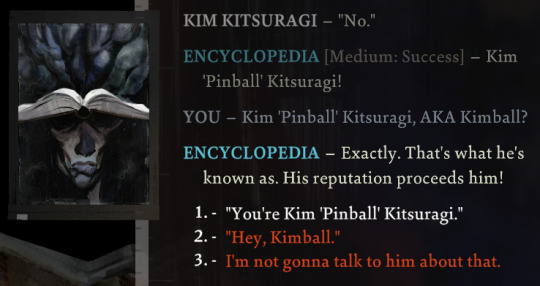
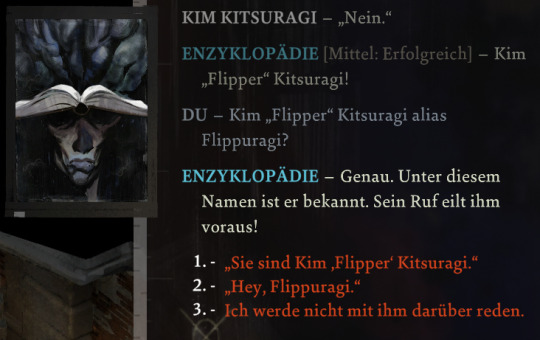
FLIPPURAGI
FLIPPURAGI

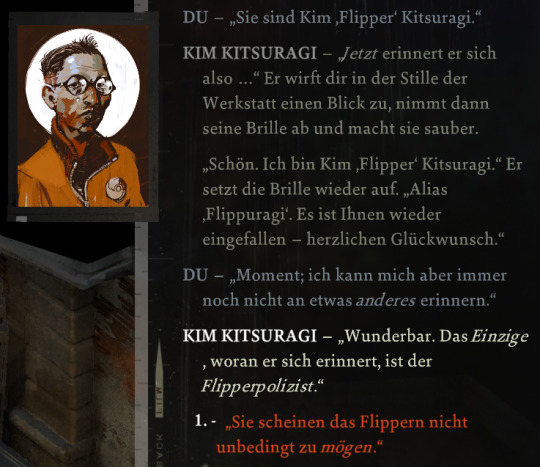
"Hey, Flippuragi"
"WUNDERBAR, THE ONLY THING HE REMEMBERS IS THE FLIPPERCOPPO"
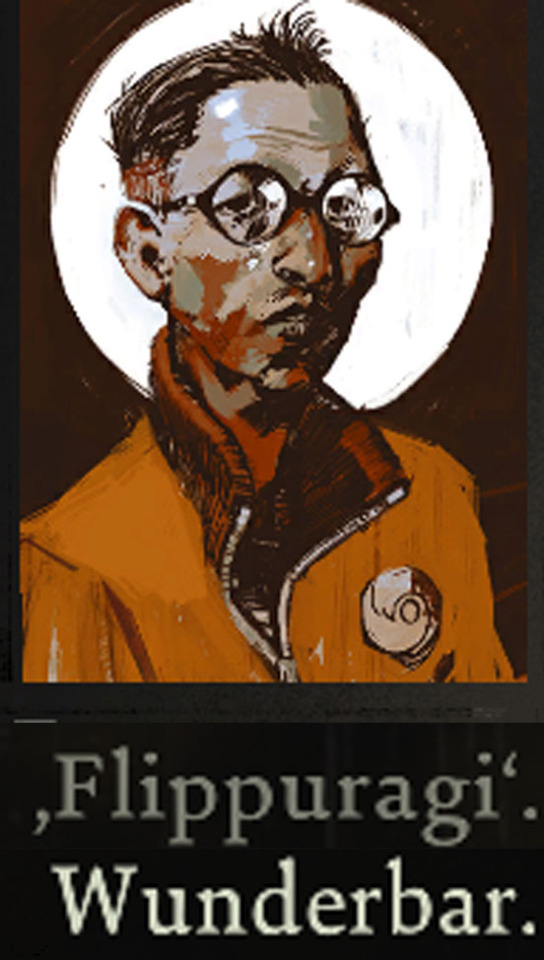
#disco elysium#german disco elysium#kim kitsuragi#harry du bois#kimharry#kimball#FLIPPURAGI#oh god I can't#de#linguistics#fun with translation#BLESS THESE TRANSLATORS#German Kim is a special kind of Kim and I love him
2K notes
·
View notes
Text
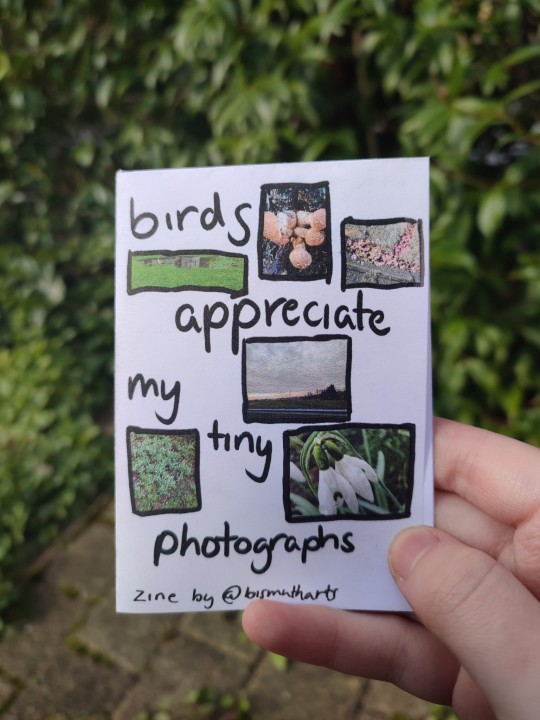
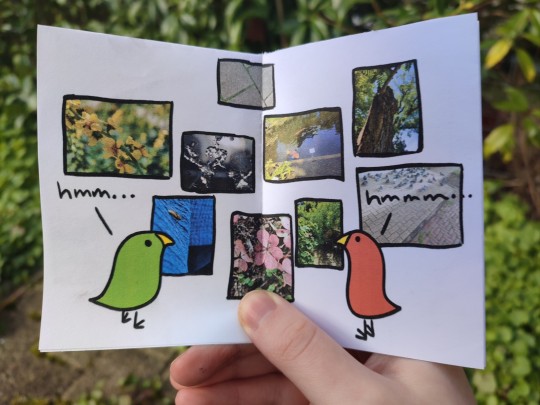
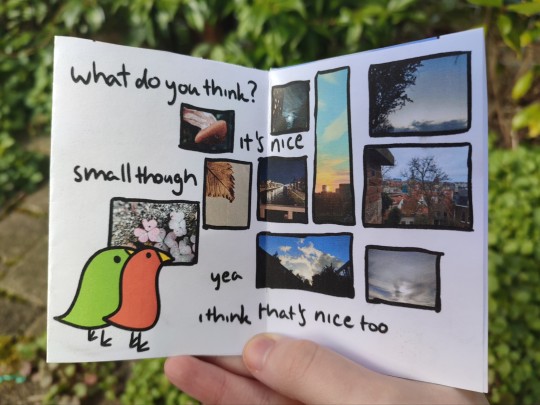
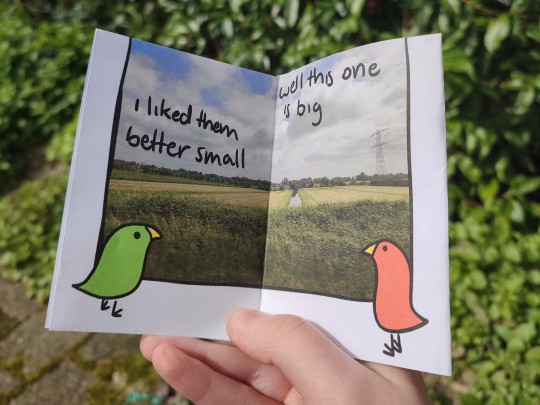
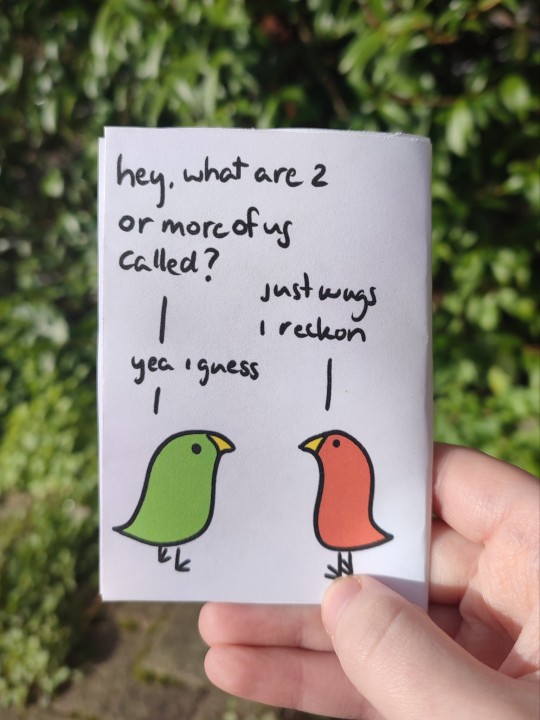
image description applying to all images: pictures of a small (a7) booklet featuring two birds, one green and one orange, talking to eachother, photographed in front of some plants and garden tiles. end ID.
i'd already made some art of this post by @jennythebot but the image it conjured in my mind was so delightful to me i decided to make a whole zine. this is my first printed zine! new skill unlocked!
in conclusion:
birds appreciate my tiny photographs! why is nobody talking about this?
#art#zine#my zine#my zines#bis arts#bird art#inkscape#digital art#8 page zine#long post#1 sheet zine#zinecraft#artists on tumblr#my art#my photos#image described#bis speaks#printable zine#silly#fun#wugs#wug#bonus linguistics joke#inspired by a post
177 notes
·
View notes
Text
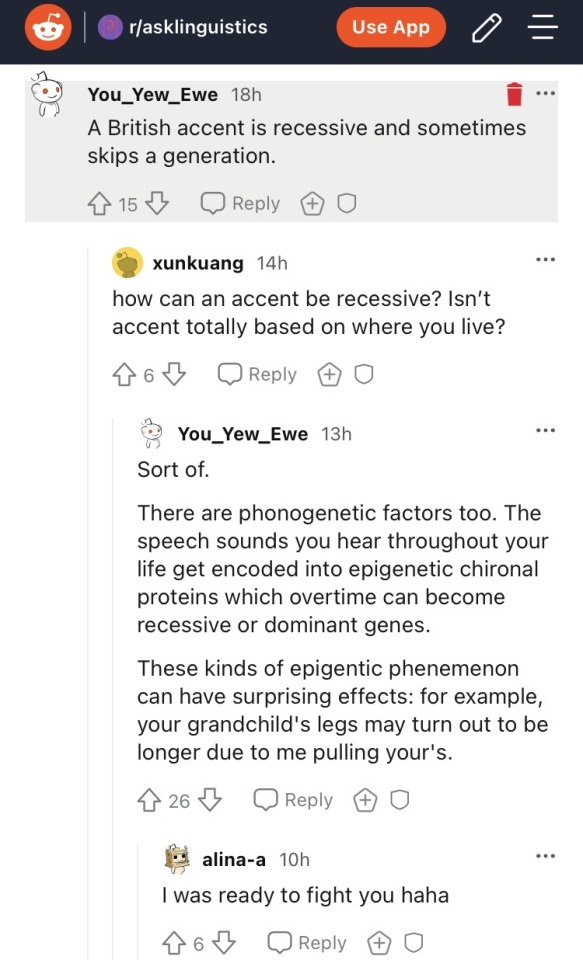
as a moderator of this subreddit i should get rid of this troll answer but it’s too good
#linguistics#Reddit#joking misinfo#astute readers will notice that it has in fact already been removed by another mod because the other mods HATE FUN apparently
4K notes
·
View notes
Note
I really appreciated your butterfly post and was wondering what ladybugs are called in Welsh. The reason I'm asking is that they have my favorite insect name in Yiddish, moyshe rabeynu's kiele (moses little calf) after the red heifer. Thanks!
I'm enjoying these so I can't help myself I'mma do another
One is wrong! The rest are real
(Apologies to ari-snail, I realise this means you will not get your answer for one working day)
#asks#wales!#closed for cleaning on mondays#linguistics#this is probably annoying to everyone else but I'm having fun and that's the main thing
426 notes
·
View notes
Text
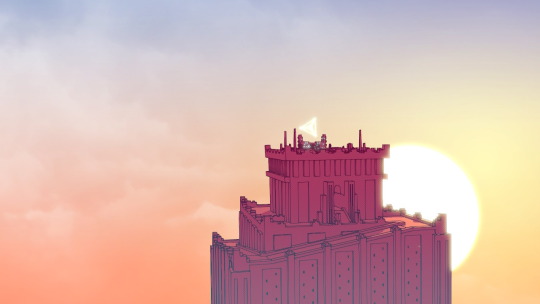



Chants of Sennaar 🛕⚔️🎭🔬
#chants of sennaar#rundisc#indie games#puzzle games#loved this#linguistics#photomode#scenery#beautiful design#the language puzzles were so fun to figure out#chants of sennaar spoilers
242 notes
·
View notes
Text
Been trying to avoid Cooking Crush spoilers on my dash but I just had to go watch the opening scenes at least because I had a feeling the subs I just saw on a gifset couldn't convey a pun going on and- Yup! That's exactly what's happening lol
Disclaimer: not a native speaker, still learning 🙏

ขอหอมหน่อยได้ไหม /khaaw haawm noi dai mai/
What Prem is actually saying: Can I have the onion?
What Ten thinks he's saying: Can I have a kiss?
You see, หอม /haawm/ here can have two meanings of different etymological origins: หอม of Khmer root means onion or allium while หอม of Proto-Tai root means fragrant, to smell sth. pleasant, and - by extension of a sniff kiss - to kiss.

หอมที่มือไง /haawm thee meuu ngai/
Prem: The onion in your hand!
Prem, according to Ten: A kiss on your hand!



The fact he barely questions this stranger's request 😂 While Prem is like What a weirdo lol
#cooking crush#thai bl#gun attaphan#off jumpol#offgun#local woman harps on about linguistics#this show is gonna be a fun ride huh?#we'll see if i'll have time to watch the entire episode before the next one airs
308 notes
·
View notes
Text
not enough ppl talk about the multilingual issue of staring at a basic object as your brain cycles through wtf it’s supposed to be called in the language you’re using like an rpg protagonist scrolling through their inventory mid boss battle.
#being trilingual just means i get to be a dumbass in 3 different fun flavors#multilingual#linguistics#spanish#french#english#gaming#rpg
2K notes
·
View notes
Text
I hope this will be short.
I guess this line is the fandom drama of the chapter?

I understand a lot of you are really passionate about the accuracy of the English translation. I just want to encourage you to try to engage with the official translation in good faith.
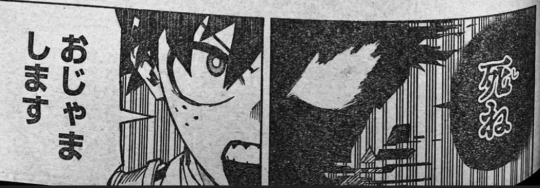

Ojama shimasu literally means "I am disturbing you/I will get in your way." It's often spoken as a greeting where the "apology" is implied (hence the brackets in my translation), but as usual context is everything in Japanese. Izuku is saying this line in defiance of Tomura's wishes. It basically comes across as Izuku plugging his fingers in his ears.
Me personally? If I were the official translator, I'd have strongly considered translating the line as "I'm coming in whether you like it or not."
The purpose in my pointing out the "common greeting" nature of this line was to demonstrate Izuku's sassiness. This is Izuku doing his "meddling where you don't technically have to" thing. The level of formality in Izuku's speech doesn't necessarily translate to actual politeness (check out @bakuhatsufallinlove's excellent post on that here).
Does "You will let me in," mean the exact same thing? Technically no, but it's the sentiment that counts. From an official translator's point of view, "You will let me in," is shorter, punchier, fits in the speech bubble a lot easier, and still conveys the general idea of what's happening in the scene.
I don't know. I wanted to talk about this because I guess a lot of people are concerned about Izuku's characterization and how it reflects on Japanese culture and how the official translation may be misrepresenting Japanese culture to the English-reading audience, and I just...can I ask that everyone take a step back a minute? Horikoshi isn't writing his story for an English-reading audience. He's not considering at all how any of this sounds to English speakers. That's the translator's job, not just to translate what is said but to translate that into the context of who is reading it. Localization is not a dirty word--it's an important aspect of translation. And the notion that Izuku is being polite and respectful here as a Japanese person is just such a...take. Izuku is being hella rude here lol. Japan itself, not just the MHA Japan but REAL WORLD Japan, notoriously has a bystander problem where people will ignore others who are being harassed because they don't wanna get involved. They won't step in to help nor will they even testify as a witness against others for fear of what it means to speak out and break from the pack. Izuku is quite obviously Horikoshi's direct answer to that phenomenon. He's meant to be an example of the morally correct thing to do, which is to be "rude" in these cases.
So I mean, sure, we can talk about what is lost in translation by the line, "You will let me in." But to me what's lost may just be grammatical and pedantic (like the passive voice that switches the onus of action onto Tomura instead of Izuku and what that may do to the focus on Izuku's rise to action here). In any case, it's not a BAD translation that changes Izuku's perceived politeness, just one that may prompt new discussion--and I don't think that's a bad thing.
162 notes
·
View notes
Text

thanks
2K notes
·
View notes
Text
WORD POLL
You CAN say:
"It will RAIN" ☔️ 🌧️
"It will SNOW" ❄️☃️
"It will THUNDER" ⚡️⛈️
"It will HAIL" 🧊🥶
BUT can you say…
If you like judging weird English sentences like this and have 12 minutes to spare on a fun multiple-choice questionnaire, you would be doing me an enormous help if you fill in this questionnaire for my final year linguistics undergrad dissertation!! You get to be at the cutting edge of linguistics research by assigning funny little scores to funny little sentences, and there are no wrong answers :)
If you reblog this to signal boost I love you <3 Thanks Tumblr!
#languages#words#grammar#english language#linguistics#poll#tumblr polls#research#if you reblog this i love you <3#fun
168 notes
·
View notes
Note
what part of italy are machete and vasco from? not their birthplace since from what i've seen you're still workshopping that. where do they live? i assume rome?
In the 1500's setting Vasco lives and was born in Florence, his family has lived there for centuries. Machete was born in Sicily, was taken to Naples to serve as an apprentice and ended up living and working in Rome (and more specifically today's Vatican city, which as you may know has been an independent country since 1929 but wasn't back then). They first met when they were both studying in Venice in their late teens/early twenties.
I think in the modern au they live together somewhere in Florence.
#characters travelling this extensively at the time#from one end of the country to another#may not be very realistic but it's more fun to include a variety of interesting historical locations#let me be greedy and self indulgent for a moment#(not to mention that Italy wasn't unified until late 1800's and was instead made of various states kingdoms and duchies#that didn't always get along with each other that well and were culturally and linguistically diverse#and some of them were actually ruled Spain and Austria for example)#I say this as lovingly as possible but the history of Italian peninsula as a whole is just a real clusterfuck#I feel like I still haven't wrapped my head around it adequately to be explaining any of this to you#but please be patient with me I promise I'm trying my best#answered#anonymous
185 notes
·
View notes
Text
Because there's an eclipse, in latin class my teacher had us translate all these old Roman dudes thoughts and shit on eclipses and incase you didn't know they filled a basin with oil or tar so they could see the reflection of the eclipse and study it, or just watch it like normal because they were also obsessed like we are
#latin#language#eclipse#school stuff#high schoolers#teenagers#school#high school#rome#philosophy#oil and tar#its cause they wouldnt ripple#learning#learnsomethingneweveryday#linguistics#facts#fun facts#roman dudes#it was called like “questions about nature”#translation#we kinda failed at that part of class tho#solar eclipse
105 notes
·
View notes